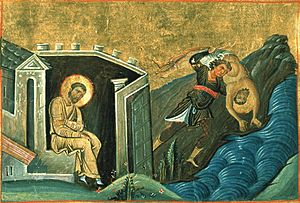Lucian of Antioch facts for kids
Quick facts for kids SaintLucian of Antioch |
|
|---|---|

Miniature from the Menologion of Basil II
|
|
| Born | c. 240 Traditionally Samosata (now Samsat, Adıyaman, Turkey) |
| Died | January 7, 312 Possibly Nicomedia (modern-day Izmit, Kocaeli, Turkey) |
| Venerated in | Eastern Orthodox Church, Roman Catholic Church, Armenian Apostolic Church |
| Feast | January 7 (Roman Catholic) October 15 (Byzantine Christianity) Monday after fifth Sunday after Pentecost (Armenian Apostolic Church) |
Lucian of Antioch (born around 240 AD, died January 7, 312 AD) was an important early Christian leader. He was a presbyter (a type of priest) and a theologian, meaning he studied and taught about religious beliefs. Lucian was also known as Lucian the Martyr because he died for his faith. He was famous for his deep knowledge and his very devoted way of life.
Contents
Lucian's Early Life and Education
Lucian was likely born in a place called Samosata, which is now in modern-day Turkey. His parents were Christians. He probably received his education in the nearby city of Edessa. This city was known for its schools and learning.
Later, Lucian moved to Antioch. This city was a major center for early Christianity. There, he became a presbyter. Some historians believe he started a special school in Antioch. This school helped train future Christian thinkers.
Lucian's Faith and Martyrdom
During a time when Christians were being persecuted, Lucian was arrested. This happened under the rule of Emperor Maximinus Daia. Lucian was taken to Nicomedia, another important city.
He was kept in prison for nine months. During this time, he was tortured many times. Despite the pain, he refused to give up his Christian faith. He was questioned twice but bravely defended his beliefs.
Lucian died on January 7, 312 AD, in Nicomedia. It is believed he was either starved to death or beheaded. There is also a story that he was drowned in the sea. The story says his body was later brought back to shore by a dolphin.
He was buried in a place called Drepanum. This town was later renamed Helenopolis. It was named after Helena, the mother of Emperor Constantine the Great.
Lucian is honored as a saint in several Christian churches. His feast day is January 7 in the Roman Catholic Church. In the Eastern Orthodox Church, his feast day is October 15.
Lucian's Work on the Bible
Lucian is well-known for his important work on the Bible. He helped to create new versions of the Septuagint and the Greek New Testament.
The Septuagint is the oldest Greek translation of the Hebrew Bible. Lucian tried to make this text more accurate. He compared it to the original Hebrew writings. His goal was to correct any mistakes that might have appeared over time.
His work became very popular in places like Syria and Constantinople. Later Christian leaders, like Chrysostom, used his versions of the Bible. These texts also became the basis for what is known as the textus receptus. This was a widely used Greek New Testament text for many centuries.
However, not everyone agreed with Lucian's changes. A famous scholar named Jerome mentioned Lucian's texts. While he acknowledged them, he also sometimes spoke negatively about them. Jerome felt that no one should change the original texts of the Bible.
Today, when scholars study old Bible manuscripts, they sometimes mark Lucian's changes with an "L". This helps them know when a reading might have come from Lucian's adjustments.
See also
 In Spanish: Luciano de Nicomedia para niños
In Spanish: Luciano de Nicomedia para niños
 | Mary Eliza Mahoney |
 | Susie King Taylor |
 | Ida Gray |
 | Eliza Ann Grier |

